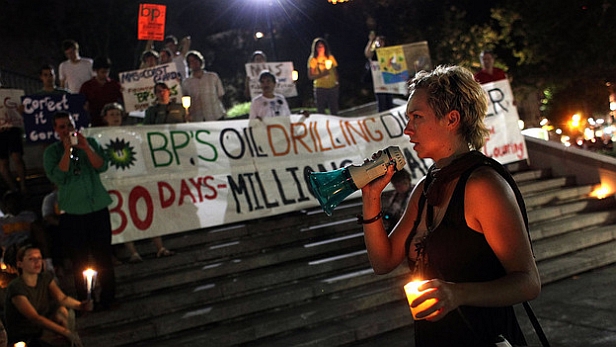This is the scene, when the coal-fired electricity that lights up New York City’s neon theatre district lowers on stage:
We are inside the home of Marie and Hovie, a young couple living in the mountain holler of Eagle Creek. With their family’s 150-year-old homestead threatened by a planned mountaintop removal strip-mining operation, Hovie, a strip-miner himself, is determined to move his pregnant wife out of the country. As the last remaining member on her family’s ancestral property, Marie is torn by their agonizing fate, and the dangerous health conditions in the mining area. When she speaks of her dream to raise their child–the 8th generation of her family to be born in Eagle Creek–Hovie divulges a deeply held secret.
“I’m sorry, baby, but the times have changed,” he says, holding his wife by the shoulders. “We have no idea how much lead or arsenic has been in our water. What are we going to put in the baby’s bottle? I’ll tell you the truth. I know those coal slurry ponds leak. I built them.”
It’s a pivotal moment in the play, “4 ½ Hours: Across the Stones of Fire,” a multimedia theatre production loosely adapted from my memoir/history, Reckoning at Eagle Creek: The Secret Legacy of Coal in the Heartland. As part of the Planet Connections Theatre Festivity, “4 ½ Hours: Across the Stones of Fire” will make its New York premiere at the Gene Frankel Theatre on June 4-13.
After a ten-year literary odyssey to research and write a personal expose on the secret history of coal mining in the American heartland, the next step of taking the page to the stage has been one of the hardest–and most exhilarating–acts in my literary career.
Reckoning at Eagle Creek is a family saga deeply rooted in the great American pastoral, an homage to the resiliency of my grandfather, a coal miner, and our family’s centuries-old woodlands culture. After my family’s 150-year-old homestead was strip-mined into oblivion, in one of the most diverse forests and historic communities in the American heartland, I set out to examine the overlooked human and environmental costs of our nation’s dirty energy policy over the past two centuries.
Strip-mining, as I learned in Eagle Creek, doesn’t only strip the land; it strips our historical memory. As a cultural history, the book digs deep into the tangled roots of the coal industry beginning with the policies of Thomas Jefferson and Andrew Jackson. It chronicles the removal of Native Americans, the hidden story of legally sanctioned black slavery in the land of Lincoln, and the epic mining wars for union recognition and workplace safety. It uncovers the devastating environmental consequences of industrial strip-mining.
As I began to adapt the history pages to the stage, working with the Coal Free Future Project, an ensemble of actors and activists from the coalfields, the characters inevitably took on their own lives. A young couple faced with the demise of their homeplace–their future, and their past–emerged at center stage of the great tragedy of strip-mining, mountaintop removal and reckless coal mining disasters still playing out across the coalfields in 24 states in our country today.
In the end, I realized the play, like my memoir, was ultimately a love story–love for your family, love for your spouse, love for the land, and what you have to do to hold onto and defend your love.
Such a love story transcends the confines of the page or stage, of course. Hundreds of thousands of tons of coal stripmined are consumed by New Yorkers every year at 13 power plants in 11 counties.
When we open at the Gene Frankel Theatre on June 4th, the rumble of mining explosives will sound far beyond the theatre walls for me. As the final assault on our holler, under the cover of darkness in their amphitheatre of destruction, Peabody Energy will detonate explosives on the once forested edges of my beloved Eagle Creek.



